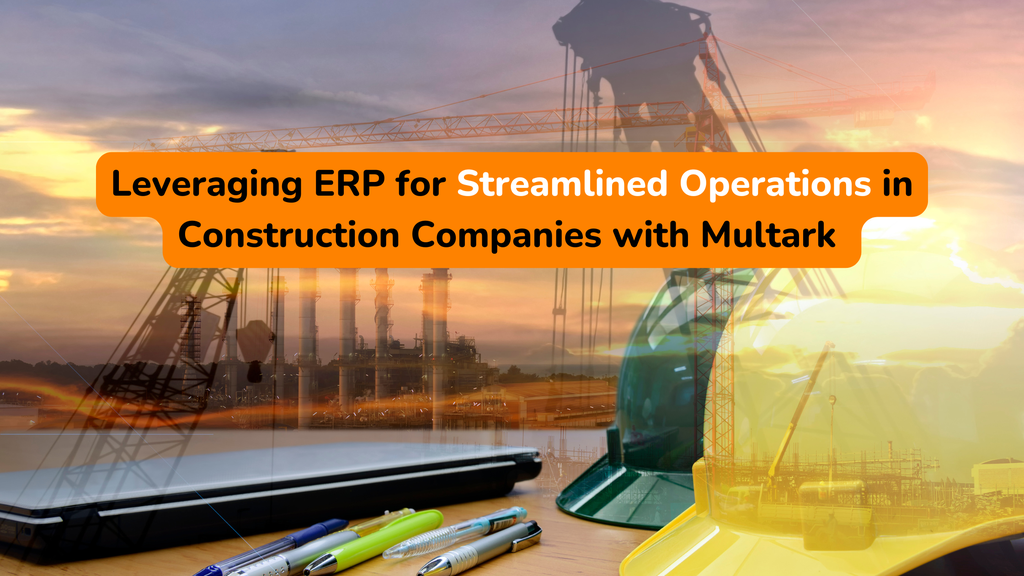Multark - Leveraging ERP for Streamlined Operations in Construction Companies with Multark
In the construction industry, managing multiple projects, schedules, resources, and budgets simultaneously can be challenging.

In the construction industry, managing multiple projects, schedules, resources, and budgets simultaneously can be challenging. Given the high level of complexity and coordination required, construction companies need solutions that enhance efficiency and streamline operations. ERP (Enterprise Resource Planning) software has become an essential tool for construction firms looking to improve productivity, control costs, and ensure timely project completion. Multark, one of the best ERP consulting service providers in India, specializes in providing customized ERP solutions tailored specifically to the unique needs of the construction industry.
1. Why ERP is Essential for Construction Companies
ERP software integrates key functions like project management, procurement, human resources, finance, and inventory management into a single system. This unification allows construction companies to have a real-time view of their entire business, making it easier to make informed decisions and respond promptly to changing demands. For construction companies, an ERP system can help manage budgets, track project progress, allocate resources efficiently, and improve communication between teams and departments.
In construction, where projects are often large-scale and involve various stakeholders, an ERP system provides a centralized platform for all relevant information. This transparency eliminates silos, reduces errors, and enhances collaboration across teams, ensuring that everyone involved has access to the same up-to-date information.
2. Key Benefits of ERP for Construction Companies
a) Project Management and Scheduling
Construction projects require meticulous planning and scheduling to ensure on-time delivery. ERP software allows construction companies to manage project timelines, monitor progress, and forecast delays or issues. It helps project managers track tasks, monitor resources, and adjust schedules as necessary. By providing a holistic view of the project lifecycle, ERP helps construction companies stay on top of deadlines, meet client expectations, and avoid costly overruns.
b) Resource Allocation and Management
Efficient resource management is essential for construction companies working on multiple projects. ERP software enables firms to allocate resources—such as labor, machinery, and materials—effectively across projects. With real-time visibility into resource availability, companies can prevent bottlenecks, reduce downtime, and ensure that resources are used optimally. Multark’s ERP solutions for construction companies allow for better resource tracking and utilization, supporting smoother operations and more efficient project management.
c) Financial Management and Cost Control
Construction projects are highly cost-sensitive, and any financial oversight can result in significant budget overruns. ERP software simplifies financial management by tracking expenses, monitoring budgets, and generating financial reports in real time. With an ERP system, companies can easily compare actual costs against budgets, enabling proactive cost control and better financial planning. Multark’s ERP solutions include robust financial management tools that help construction companies stay on top of expenses, manage cash flow, and ultimately increase profitability.
d) Improved Communication and Collaboration
An ERP system provides a single source of truth, which improves communication and collaboration across teams and departments. With ERP, project updates, financial data, and resource availability are accessible in one place, reducing miscommunication and ensuring all stakeholders have access to accurate, up-to-date information. This streamlined communication is especially beneficial in construction, where timely information sharing is critical to project success.
e) Compliance and Risk Management
Construction companies must adhere to numerous regulations and industry standards, making compliance management crucial. ERP systems help firms stay compliant by tracking regulatory requirements and ensuring that necessary documentation is readily accessible. Additionally, ERP systems can help companies identify and mitigate risks by providing tools for risk assessment, monitoring safety protocols, and managing incidents.
3. Multark: Leading ERP Consulting Services for Construction Companies
As one of India’s top ERP consulting service providers, Multark specializes in ERP implementations tailored to the construction sector. Multark offers a comprehensive suite of ERP services, including system selection, customization, data migration, training, and ongoing support. By focusing on the specific challenges of construction, Multark provides ERP solutions that align with industry needs and help construction companies operate more efficiently.
Multark’s approach to ERP consulting emphasizes understanding each client’s unique needs and delivering tailored solutions that drive measurable results. With years of experience in ERP consulting, Multark ensures that the implementation process is smooth, minimizing downtime and maximizing return on investment.
Conclusion
In an industry as demanding as construction, ERP software can be transformative. By improving project management, enhancing resource allocation, streamlining finances, and boosting collaboration, ERP systems enable construction companies to operate with greater efficiency and control. Multark’s expertise as a leading ERP consulting service provider in India ensures that construction companies get ERP solutions tailored to their needs, helping them achieve greater productivity, cost-effectiveness, and project success.
With Multark’s customized ERP solutions, construction companies can focus on delivering quality projects while staying competitive and agile in a rapidly changing industry.
Will the ERP cover other modules? What are the scope for integration?